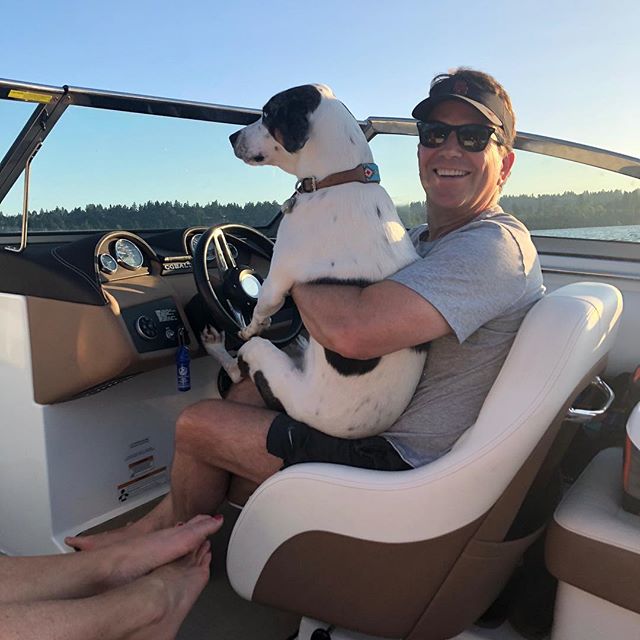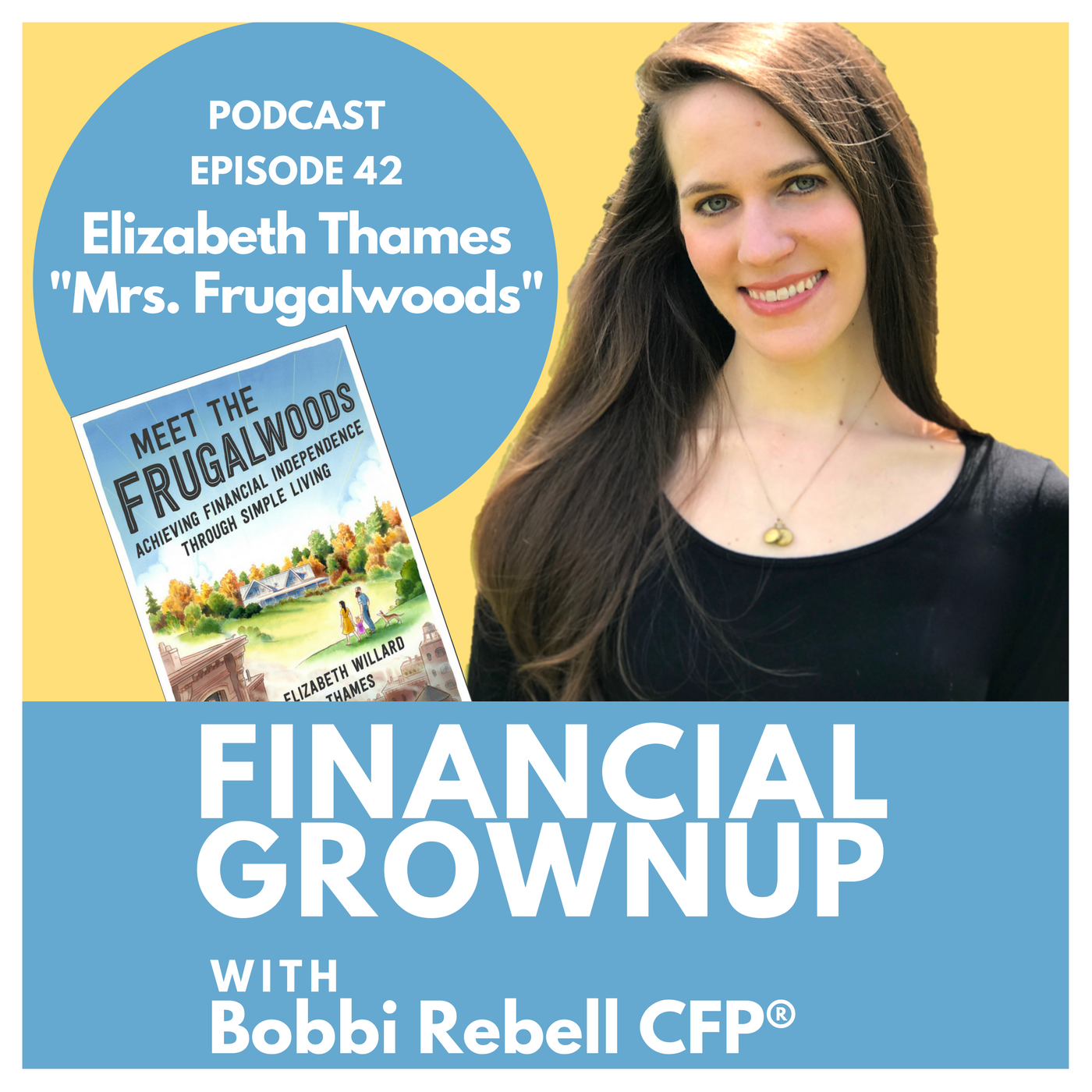Transcription
KJ Dell'Antonia:
I wouldn't let them spend $500 on a virtual thing, but if you want to nickel and dime yourself up to $100 in a month, I'll let you know it's happening, but I'm going to let you do it if you have $100.
Bobbi Rebell:
You're listening to Financial Grownup with me, certified financial planner Bobbi Rebell, author of How to Be a Financial Grownup. You know what? Being a grownup is really hard especially when it comes to money, but it's okay. We're going to get there together. I'm going to bring you one money story from a financial grownup, one lesson, and then my take on how you can make it your own. We got this.
Bobbi Rebell:
Hey, Financial Grownup friends. That was new friend, KJ Dell-Antonia talking about her kids and letting them splurge on virtual purchases, something, by the way, we disagreed on. I got to meet her recently at Podcast Movement, and we bonded over all things money and parenting. When I heard she had a new book coming out, How to Be a Happier Parent, I was all over it. You knew she was coming on. This is a great interview.
Bobbi Rebell:
Welcome to our new listeners. For those of you just discovering us, we're so glad that you're here. As a regulars know, we keep the shows short, around 15 minutes, so you can fit it into your busy life, but we also know some of you have more time so we do three a week. Feel free to listen to a few at a time. Subscribing will make this easier. Don't forget. Go into the settings, set up auto download. Then you don't have to do anything more. Automate your podcast like you automate your savings.
Bobbi Rebell:
Let's get to KJ. Her book is super practical and -- I love this part -- very specific. It's like a roadmap. Very well researched, but it also has a lot of information about her family life which is fascinating by the way. She talks a lot about it in her interview. Here is KJ Dell'Antonia.
Bobbi Rebell:
Hey, KJ Dell'Antonia. You're a financial grownup. Welcome to the podcast.
KJ Dell'Antonia:
Thanks for having me.
Bobbi Rebell:
You are the author of so many things but most recently How to Be a Happier Parent which no one needs. We all need this. We all need this so badly, and you're the perfect person because you are the former lead editor of the New York Times mother lode. You're still involved in that kind of writing as well. Congratulations on the new book which is coming out.
KJ Dell'Antonia:
Thank you. Thank you. I'm really excited.
Bobbi Rebell:
This is a perfect podcast for you because you were basically born a financial grownup. Tell us your money story.
KJ Dell'Antonia:
I was definitely raised a financial grownup. I'm an only child, and my dad in particular was really determined that I would understand the value of a dollar and understand how the financial system worked. People say there are those who understand compound interest and then there are those who pay it. He was determined that I would be the one who understood it.
Bobbi Rebell:
What was his job? What was his background?
KJ Dell'Antonia:
He's in computers.
Bobbi Rebell:
Okay.
KJ Dell'Antonia:
He was not a financial advisor. It's just money is an important part of life, and it was important to him that it be something that I understood. If I had a lemonade stand, I had to pay for all the ingredients and justify how much we were spending versus how much we were making. As I got older if I needed a loan for something, I he would charge me interest. I would really ... I mean I had to pay him every month certain amounts. He set up a checking account for me really early. He got me a credit card really early that I got the bills for. I mean to have missed a payment and paid interest on that credit card, I mean I can think of nothing more shameful.
Bobbi Rebell:
Oh, no. So now you are officially the financial grownup of the household. You have four children.
KJ Dell'Antonia:
I do.
Bobbi Rebell:
How is this now translating into how you are teaching them to be independent financial adults and then therefore you will be a happier parent?
KJ Dell'Antonia:
That is the hope. We do give them an allowance. It is not an exchange for work. That's a Ron Leiber tip that I have completely embraced. He's the author of The Opposite of Spoiled. I will pay them for jobs that I would pay someone else to do. Now, they are 17, 14, 12, and 12. The 17-year-old and the two 12-year-olds take care of the lawn because I paid someone else to take care of the lawn. In our house, you have to pay for your own electronics. If you want a phone, you have to save up. You have to be able to pay the monthly bills for it.
Bobbi Rebell:
So before we were recording, you joked but I think you were also somewhat serious that you are not as good at teaching your children to become financial grownups as your dad was in your case. What's different?
KJ Dell'Antonia:
When I was growing up, I wanted Gloria Vanderbilt jeans or Doc Martens or whatever. My kids want Fortnite money. I feel like helping them to sort of keep track of digital money is really challenging.
Bobbi Rebell:
Yeah. So what do you do? I've had this happen where your kid wants money to buy something that is virtual. It's an in-app purchase that's not actually a thing. It's like a new avatar or something that, for me at least, I really don't want them to ever spend a penny on ever. You're okay with them buying these virtual things in these games?
KJ Dell'Antonia:
Once it's their money, I'll talk to them. At the end of a month, I might say "Do you realize how much you spent?" Especially when it comes ... I've got one now that wants a phone. Boy, you better bet I'm going "Yeah, look how much you spent on Pokemon Go. You could have had a quarter of a phone for that." Once it's their money, I pretty much let them spend it on whatever they want within some limits. I wouldn't let them spend $500 on a virtual thing, but if you want to nickel and dime yourself up to $100 in a month, I'll let you know it's happening but I'm going to let you do it if you have $100.
Bobbi Rebell:
Can you tell me, for each of them quickly, what are their primary income streams? It is all just for tasks that you would pay other people for? Or are there other things that your kids are doing to earn this money?
KJ Dell'Antonia:
I have a 17-year-old. He has a small business selling maple soda and maple iced tea at our farmer's market. He's struggling to make a profit at it, but he's finally getting there. He's got allowance saved, and we also have a small farm so I will pay him for farm work. He's hauling hay bales and driving the tractor. When we're in really the throes of farm work, I hire his friends as well. He makes $15 an hour from me. My 14-year-old daughter is a huge babysitter so she gets paid to babysit. In fact, she doesn't do any lawn work. She doesn't want to do lawn work, and she's got her income stream. She babysits. The other ones do mostly lawn work for me and allowance and saving up birthday gifts still, but they're both only 12.
Bobbi Rebell:
What is the lesson from this? What advice do you have for parents in this situation teaching kids about money?
KJ Dell'Antonia:
If you can set them up with some kind of savings where they can see the interest coming in ... My dad actually had something where they would mail me a little tiny check for the interest. I'm not sure how he came up with that, but he kept these minuscule checks. It was neat and it was educational. If you have to have sort of virtual money as we do, I mean all this allowance that I'm talking about, it tends to be virtual. We use an app. Make sure you talk about what's going in and what's going out.
Bobbi Rebell:
All right. Let's talk about your everyday money tip. I've done this so I was really excited to hear this. Go for it.
KJ Dell'Antonia:
If you have kids and you're traveling with kids and this would make you happier, book two hotel rooms. There was a woman in my book who was talking about this and she had a partner, and she was like "No sex on vacation is not a good vacation." That's part of the reason, but part of the reason is just for your own sanity. You have a little ones. You put them to bed. You retire to your own room. You get an adjoining room. Spend a little less time in the location and a little more money on making that a more comfortable experience.
Bobbi Rebell:
One day less you probably won't miss. You'll still really have the experience.
KJ Dell'Antonia:
Right.
Bobbi Rebell:
I love that idea.
KJ Dell'Antonia:
Yeah, I feel like one day less but a more pleasant days that you have there is going to be worth it. My folks would have said "But you're just sleeping there because we're going to get up and go." You got to decide what works for you.
Bobbi Rebell:
Yes. That's a lot of the themes in your book, How to Be a Happier Parent, which is coming out right as the kids are heading back to school. It's a perfect time for parents to really be proactively thinking about parenting and-
KJ Dell'Antonia:
Yes.
Bobbi Rebell:
... the decisions that they make and the systems that we put in place when we get back into our routines in the fall. I love this quote. "It's hard to find happiness when every day is a race against a clock we don't set."
KJ Dell'Antonia:
Yeah. Part of what I'm trying to do in the book is help you to set the clocks you do control. We talk about mornings, homework, screen time, all the stuff that as we, like you said, get back into our normal routines, we're really looking and going "Okay. How are we going to handle that this year?"
Bobbi Rebell:
One other part of the book I love is there's four things that can make parents happier.
KJ Dell'Antonia:
Parents who say that they're happier in their parenting, that they feel sort of better about it, they tend, when their kids are younger, to be one the more involved side. When they are parents of older kids, they tend to describe themselves as doing things that encourage independence in their kids. That's one thing, sort of that evolution from helping to letting go and letting your kids do what they're capable of. Happier parents have a real mindset of recognizing when things are pretty good even if some things are bad. Looking around at a moment when the kids are bickering and maybe there's a lot of homework and dinner's not on the table and recognizing to yourself that "Hey, it's a rough evening, but really overall this is what I wanted. We're all healthy. We're all happy. We're here together" and just soaking in that good feeling.
KJ Dell'Antonia:
Happier parents also, they know what's really big. I call it's what's a tiger and what's not a tiger. Most of the things in life that stress us on behalf of our kids are not a tiger. There will always be another balloon. There will always be another lost Thomas train. There will always be another best friend and there's another college. Those things are ... When things go wrong for our kids, it's stressful, but typically, it's not a tiger. The last thing that happier parents tend to say is that they don't put their children's everyday needs above their own. When they're looking at something like what to serve for dinner or where to go on vacation, they don't pick based on what will make the kids happy. They pick based on what's going to make the family happier. Sometimes we should be looking at them and going "I'm sorry. I can't run you to Jessie's house because I've got a tennis game in 10 minutes. You'll have to find another way to get there."
Bobbi Rebell:
Exactly. I do have a pretty regular tennis game on Saturday mornings with my friend. You know what? I get home and my son gets to sleep a little late and it's okay.
KJ Dell'Antonia:
Yeah.
Bobbi Rebell:
It's important for us to stick to activities. You talk about this in the book too. To stick to activities that made us happy before we had kids and just keep doing it. It sets a good example for them. Tell us more about the book, where they can see you, where they can learn more about you, and all that good stuff.
KJ Dell'Antonia:
The best way to find me is kjdellantonia.com. You'll also find me in the New York Times. There's a couple of excerpts from the book that are running or have run, one in the Boston Globe as well. Howtobeahappierparent.com will also work. All the urls, all the things. On Instagram, I'm @kjda, and everywhere else, I'm KJ Dell'Antonia.
Bobbi Rebell:
Excellent. Well thank you for all that you do for all of us parents. We truly appreciate it. A lot of what you say actually goes for just about everyone in people that you deal with in your everyday life. Great perspective. Congratulations on the new book.
KJ Dell'Antonia:
Thank you.
Bobbi Rebell:
I love that KJ isn't afraid to do things differently from her parents even though she admits they did a good job teaching her to be financially responsible. Financial Grownup tip number one. As we raise kids, we may think that our strategy to teach kids to be financially responsible will be the same as other parents, but think again. Some people will insist they want to pay kids for everything. Some don't believe in paying kids for things they should be doing as a member of the family.
Bobbi Rebell:
There are parents who will -- this is true -- give teenagers credit cards or debit cards with zero restrictions saying "I don't want them to think we can't afford something" or they say they'll monitor their spending and, this way, they can see everything going on and have a discussion about it. I can see the logic. Or they just don't want to bother to talk to their kids about it because they're busy so life goes on and there's no plan and no cap on spending. They just kind of give the kids money haphazardly.
Bobbi Rebell:
Whatever you decide, make it deliberate and I do think it is a good idea to get ideas from other parents, but don't feel pressured to do what they do. Just because your kids bestie has an unlimited credit card doesn't mean you have to do that too. My siblings and I, for example, we had to present a budget to our parents at the beginning of, let's say, a semester of school and then if they approved it and funded it, we had to live within that and that was that.
Bobbi Rebell:
Financial Grownup tip number two. I love KJ's tip about travel. The truth is, if you prefer to stay at a nicer hotel or have that extra room like KJ says, just make the trip a little shorter. You'll still have the experience and it will cut down on the tension and make the whole thing a lot more enjoyable.
Bobbi Rebell:
Thanks to all of you for joining us. Tell us more about your financial grownup experiences. DM me. I am @bobbirebell on Twitter, @bobbirebell1 on Instagram, and on Facebook at Bobbi Rebell. To learn more about the show, go to bobbirebell.com/financialgrownuppodcast which will also get you to the show notes. Those are always at bobbirebell.com/ and then the guest name. In this case, KJ Dell'Antonia. Thanks to KJ for sharing such great tips and insights, helping us all get one step closer to be financial grownups.
Bobbi Rebell:
Financial Grownup with Bobbi Rebell is edited and produced by Steve Stewart and is a BRK Media production.











